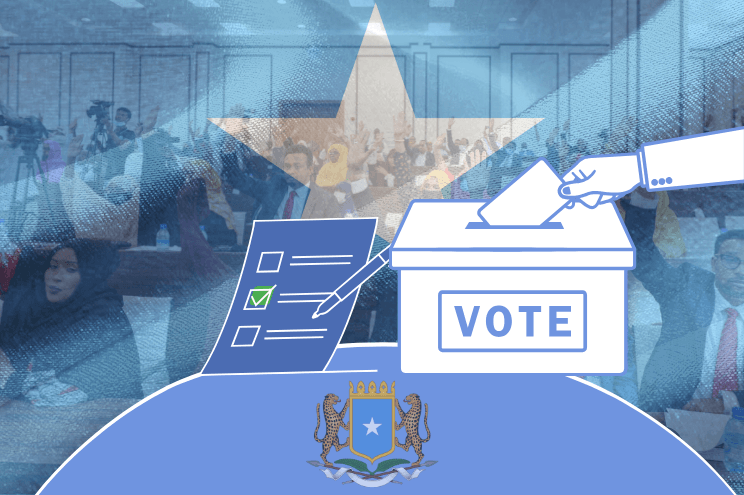Somali Public Agenda
December 23, 2024
Success Stories
Somali Public Agenda
December 23, 2024

Somalia’s federal government and Federal Member State (FMS) leadership agreed on an electoral process in May 2023. Although core elements of the agreement were contentious and key actors were opposed, the political agreement became a baseline for both the review and amendment of Somalia’s Provisional Federal Constitution, particularly Chapter Four, as well as the structure and drafting of three election bills – the Establishment Bill of the Independent National Electoral and Boundaries Commission, the Political Associations and Parties Bill and the National Electoral Bill.
The Council of Ministers approved the three bills in July and August 2024. The bills were supposed to be submitted to the parliament for deliberation and approval since they, along with the Council of Ministers appointment and parliamentary approval of 18 commissioners of the Independent National Electoral and Boundaries Commission, would be crucial for the implementation of federally-led national elections.
SPA Review and Analysis
Somali Public Agenda wrote and published three pieces of analysis, each focusing on and analyzing the content and implications of the bills. We published a Review of the new bill establishing the Independent National Electoral and Boundaries Commission on August 25. The commentary, which was published in English and Somali, analyzed the key provisions of the Establishment Bill, the differences between the new Commission & the previous National Independent Electoral Commission (NIEC), the implications of the bill, challenges, and recommendations.
We published our second commentary titled ‘Re-instituting Party Politics: An Analysis of the New Political Associations and Parties Bill’ on September 11. The paper, which was published in English and Somali, analyzed the substantive provisions of the bill (particularly provisions on the difference between political associations and political parties, the right to political participation, structure of political associations and political parties, registration requirements and fees, transitioning from a political association to a political party, financing political associations and parties, and status of previously registered political parties), implications of the Political Associations and Parties Bill, and the way forward.
Similarly, we published a policy paper on the National Electoral Bill titled ‘Somalia’s New Electoral Bill: Insights and Implications‘ on September 29. The paper analyzed key provisions in the electoral bill, particularly the provisions on election management, the electoral model, local council elections, voter registration, candidacy and campaigns of political associations & political parties, voting, vote counting, and announcement of election results, and election delays. The paper also analyzed the parliamentary review and approval process and core challenges and concluded with several policy considerations for legislators.
Reach and Impact
Although we disseminated our publications online and produced short videos where researchers explained the content of these analyses to expand the outreach, we also engaged and shared these analyses with relevant federal government institutions and members of the federal parliament. When the parliamentary 15-member ad hoc committee was formed to lead the parliamentary review process on the electoral bills, SPA also engaged and interacted with its members and shared the three papers with the committee.
Moreover, our Executive Director, Mahad Wasuge, on November 14, attended a consultation meeting organized by the ad hoc parliamentary committee responsible for reviewing three election-related bills. The discussion focused on the political associations and parties bill. SPA was invited to present our analysis of the political parties bill. During the meeting, Mahad presented our recent publication on the parties bill and emphasized the need for the parliament to reduce the registration fee and clarify the term limits for national political parties. In addition to the presence of the parliamentary ad hoc committee, representatives from the temporarily registered political parties under the previous Law No. 19 of June 27, 2016, and civil society representatives were present at the consultation meeting, and our presentation framed the discussion.
When the parliament approved all three bills, we engaged with policymakers and also reviewed the approved laws. We noted that a number of our recommendations were incorporated into the laws, particularly on the political parties law. Some of the recommendations that were incorporated into the political parties law included reducing the prohibitive $100,000 registration fees of political associations to $10,000. Another key recommendation we suggested, which is reflected in the political parties law, particularly article 34, is limiting the tenure of the three national political parties to 15 years.
While we understand that the electoral process is contested and that there are key political stakeholders, including Federal Member States and former federal leaders who opposed both the amendments made to the constitution on March 30, 2024, as well as these related election laws, SPA objective in analyzing the bills and influencing the involved policymakers was to improve the content of these laws, expand understanding of their key provisions and implications, and flag limitations to broader public participation.
Somali Public Agenda (SPA) is a non-profit, non-partisan, and independent public policy and administration research and action organization based in Mogadishu. It aims to advance understanding and improvement of public policy and services in Somalia through evidence-based research and analysis, dialogue, policy and service design, and training.
Stay updated on governance and public services in Somalia!